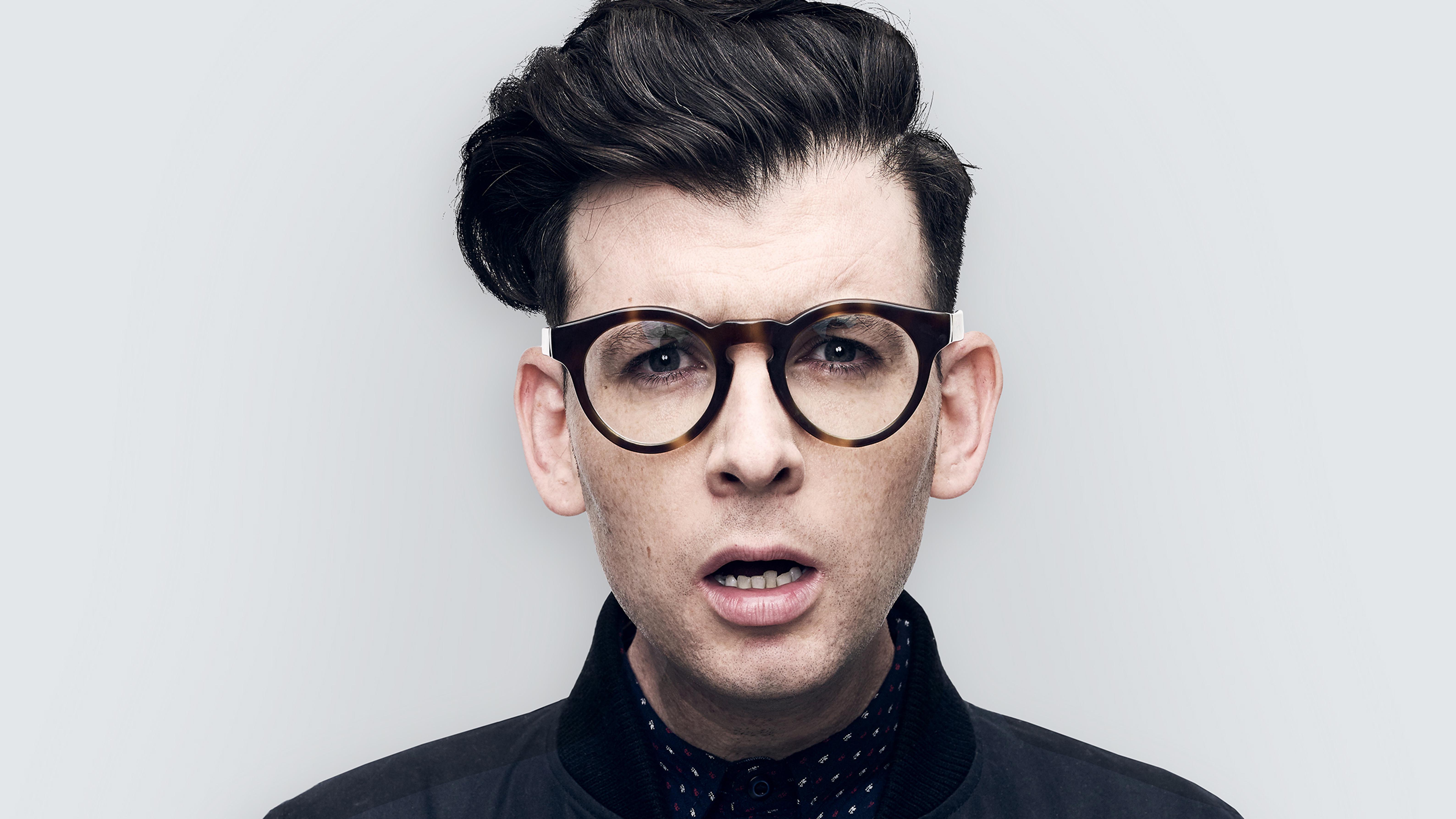The first clue to how stand-up comedian Moshe Kasher approaches his talk show differently from most other late-night hosts: the set. Eschewing the traditional “talent on this side/audience on that side” line in the sand for a theater in the round, as Kasher has chosen to do for his new show Problematic, feels both more modern and like a throwback bordering on the gladiatorial: Not even the stage’s shag carpet can soften the intensity of that focal point.
But intense focus is exactly where Kasher thrives. His whole life is an open book—literally, as detailed in the memoir of his tumultuous youth, Kasher in the Rye. (The full title, The True Tale of a White Boy from Oakland Who Became a Drug Addict, Criminal, Mental Patient, and Then Turned 16 is both a summary of his background and a sample of his loquacious, motormouthed stage presence.) “I learned how to talk in front of people in twelve-step groups that I went to when I was young,” he explains when asked about his development. “That was a nice training ground. But also, I’ve always liked attention.”
Beginning with his upbringing under two deaf parents, he’s always confronted the more difficult aspects of life head-on with discussion—and droll wit. “The gallows humor is a big part of who I am and how I was raised,” he says. “That’s definitely how I figured out how to cope with all the insanity of my childhood, through finding the funny in the depths of the scary parts. That’s what the show [is] about: finding comedy in the topics that will seemingly be, on the face of them, ripping apart our society. How do we have a conversation about it and have a good time?”
After twelve years of spinning his life into unfiltered, unflinching material as a stand-up, writer, and podcaster, Kasher had Comedy Central’s interest in creating a platform for his aggressive intelligence. Alex Blagg, Kasher’s old San Francisco comedy compatriot and one of @midnight’s co-creators, approached him with intent to develop a show together. “We agreed there was a missing zone of an intellectual space sillier than The Daily Show, but more serious than @midnight—somewhere in the middle,” he says. Inspired by ’80s daytime talk shows like Donahue and Geraldo, Kasher, Blagg, and Comedy Central developed Problematic, which takes on a relevant topic every week with a guest panel, a studio audience, and more profanity in a single segment than Oprah saw in her entire run.
“This is not a debate show; it’s a comedy show, first and foremost,” he clarifies. But he was eager to use his show as an outlet for socially conscious conversation. “These things that feel like they’re going to destroy us, if we can just talk about them, disinfect them with a little bit of conversational sunlight, that can’t be a bad thing.” As the host of a show that dismantles current-event absurdities, from gun control to cultural appropriation, Kasher intends to illuminate both sides of an issue—or at least mock them evenly. “I consider myself a leftist in the truest sense of the word. I am a person who was raised on welfare and cares deeply about social justice and racial equality. And yet, I find that people in my camp can be very annoying. I care about allowing people with positions that are anathema to me being able to express those positions.”
Kasher’s commitment to communication means equal-opportunity criticism. “There’s an inherent hypocrisy to both sides. I think the left sells free speech short and would rather have a controlled intellectual environment that bolsters their worldview, and the right wants unfettered free speech to run roughshod over decency. But there’s no world in which everyone who disagrees with you is wrong 100 percent of the time.”
“These things that feel like they’re going to destroy us, if we can just talk about them, disinfect them with a little bit of conversational sunlight, that can’t be a bad thing.”
After exhaustive research on all the angles of a chosen topic—both on the page (Kasher gestures to a pile of printed articles as thick as his spectacles, which is saying a lot) and in the field (he recalls his recent first visit to a shooting range as “fantastically unpleasant”)—Problematic’s episodic format leads with the host introducing the topic in a brief monologue before bringing out three guest panelists to alternate between discussing and riffing, all amidst relevant reference clips and pre-taped segments.
But it’s in Act Three of Problematic that its biggest distinction and anything-but-secret weapon is revealed: the audience. Not only are they in every shot, owing to the shape of the set, but they’re also the source of the show’s heat. Kasher roams the crowd, soliciting reactions from the front row and all the way back in the hard-to-reach places, microphone and note cards in hand.
Results, as you might imagine, vary, The crowd is young and diverse. Reps with nonprofits plug their groups, while others readily admit they just lied to get the spotlight. One volunteer eagerly recounts the plot of an episode of Black Mirror. Problematic tapes in LA, after all; people arrive ready to grab attention. Sound chaotic? “Very chaotic. That’s what makes me happy,” Kasher grins. “More than material, what makes me happy is finding the energy in the audience. I think we’ve found a way to infuse the crowd magic into a televised format. The participation is the thing that shakes this into a new realm: ‘comedic daytime talk.’”
That realm breaks noisily into our world on Tuesday nights, and the time between tapings will no doubt offer Kasher plenty of chaos to fuel his discussions. “The absurdity is everywhere, and we think it’s real life,” he laughs. “And the bad news is, it is.” FL







